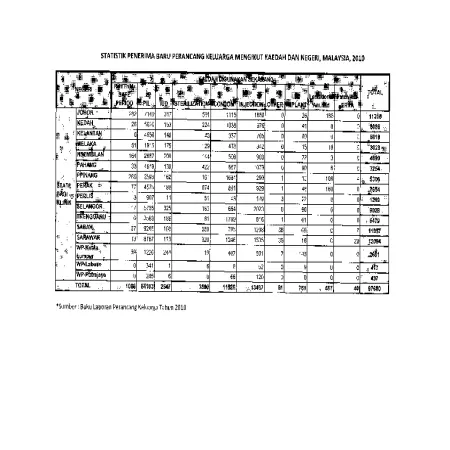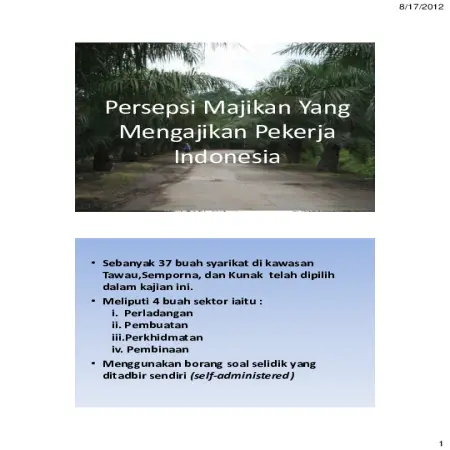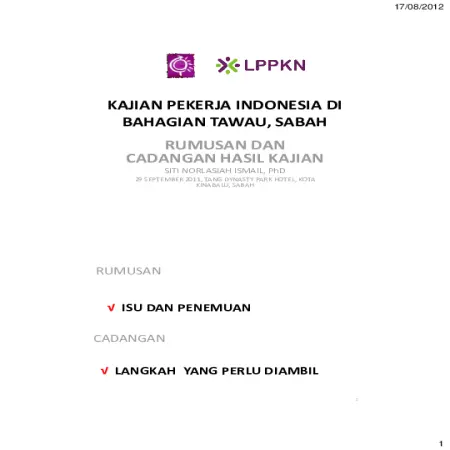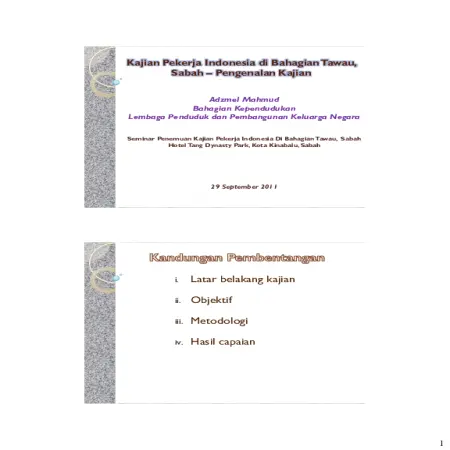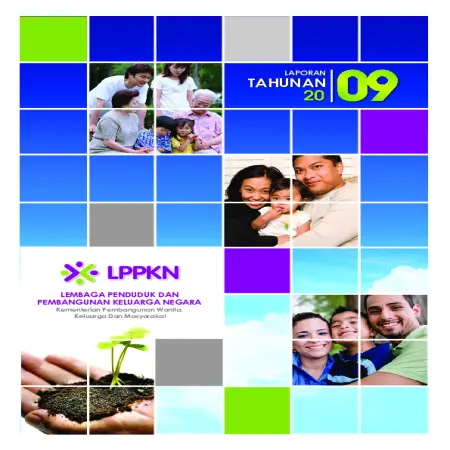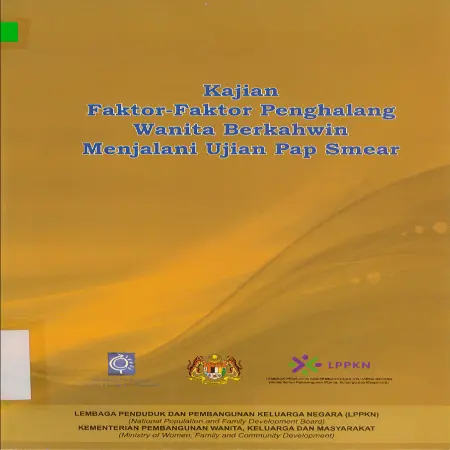Browse by Year
|
|
Persepsi penduduk tempatan terhadap kehadiran pekerja Indonesia di Bahagian Tawau, Sabah
Item Type: Conference or Workshop Item
Editor:
Year: 00/00/2011
Abstract: A total of 37 companies in Tawau, Semporna and Kunak were selected in this study which covers 4 sectors namely plantation, manufacturing, services and construction. This study uses a self-administered questionnaire. The majority of employers in all sectors were found to provide facilities and welfare such as accommodation (employees only), health and medical treatment facilities and insurance to their Indonesian employees. More than 80.0 percent of employers in all sectors fully fund facilities and welfare such as workers' insurance (94.4%), treatment and health facilities for workers with family members (88.6%), and shelter for workers (82.4%). This presentation slide describes the perception of employers who employ Indonesian workers.
|
|
|
|
|
|
Kajian pekerja Indonesia di Bahagian Tawau, Sabah: rumusan dan cadangan hasil kajian
Item Type: Conference or Workshop Item
Editor:
Year: 00/00/2011
Abstract: There are several factors for the entry of Indonesian workers to Sabah, among them is finding a job, earn a higher income as well as proximity to the country of origin. Recommendations and measures to be taken are to improve the enforcement of existing policies and laws, for example not being allowed to bring family members for unskilled and semi-skilled workers, prompt repatriation for foreign workers staying beyond the period (5 years) and employers bearing the cost of delivery come back. The next step is to curb the entry of illegal workers or immigrants, especially through illegal entrances (border control). Employers need to give priority to locals to work by giving higher wage rates or salaries. The government needs to set a minimum wage in every employment sector and plan workforce requirements updated. The government needs to encourage employers to move to mechanization and automation, especially for the plantation sector to reduce dependence on labor (unskilled and semi -skilled). Lastly, government should provide guidelines for the residence of foreign workers and facilities in the workplace as well as undergo regular monitoring by relevant agencies, and also encourage socialization with local residents. This presentation slide will describe the issues and suggestions that need to be taken as a result of the study of Indonesian workers in the Tawau Division, Sabah.
|
|
|
|
|
|
Kajian pekerja Indonesia di Bahagian Tawau, Sabah: pengenalan kajian
Item Type: Conference or Workshop Item
Editor:
Year: 00/00/2011
Abstract: The objective of this study is to identify the causal factors of entry and conduct socio-demographic analysis such as family, education, health, family planning practices, citizenship and socialization of Indonesian immigrants. The next objective is to study the perception of dependence on Indonesian workers as well as the impact of the presence of immigrants/Indonesian workers on the local population in terms of economy, security, family, culture, education, health, social and legal. The last objective is to identify the factors of hiring foreign workers, the process and costs of hiring, wages and employment, and the facilities provided by employers to foreign workers.
|
|
|
|
|
|
Kajian Penilaian Modul Pendidikan Kesihatan Reproduktif dan Sosial (PKRS) dalam kalangan Pelatih PLKN
Item Type: Research Report
Editor:
Year: 00/00/2011
Abstract: Adolescents are the future leaders of the country and have a huge influence on the social, economic and political situation of the country. However, with the presence of various social problems that plague teenagers today, it is feared that it will affect their future which in turn is detrimental to the country. The Ministry of Women, Family and Community Development (MWFCD) has taken the initiative by developing the Reproductive and Social Health Education Policy and Action Plan (PKRS) which aims to produce individuals who are knowledgeable and have a positive attitude in the field of reproductive and social health. Under this PKRS program, the National Population and Family Development Board (NPFDB) is one (1) of the agencies that implement the program. In line with the implementation of this policy, the National Service Training Council has agreed with MWFCD's proposal for PKRS to be implemented in PLKN. Following that, NPFDB has implemented one (1) Pre and Post Test Study to trainees to assess the level of knowledge and perception on reproductive and social health before and after the teaching of this PKRS module is conducted. This study also aimed to examine the sexual and reproductive behaviors of trainees.
This study was conducted in 2011 in a cross section on PLKN Trainees aged 17 years and above in selected National Service Training Camps in Malaysia using independent random sampling. The total sample required was 1,038 people. The calculation of this sample size is based on an estimated 31,200 PLKN trainees who are required to attend training using Confidence Interval (95%), Margin of Error (1.5%) and Prevalence of Having Sex Out of Wedlock Among Adolescents (6.5%), (Naing L, 2006). Questionnaires were developed according to the needs and objectives of the study. One-third of the questions of this questionnaire were adapted from an international study, namely the Youth Risk Surveillance Survey, 2011 but adapted according to the objectives of the study and the culture of the community in Malaysia. The method of questionnaire administration was self administered. The scope of the questionnaire covers three (3) domains namely demographic information, knowledge and attitudes towards reproductive and social health as well as adolescent sexual behavior. A total of 1,300 pieces of assessment forms (pre and post -test) were distributed during the first teaching session of the module. Of that number, only 1,063 forms were received for analysis. After the initial analysis was conducted, it was found that there were some questions that were not fully answered by the respondents. Therefore, the data analysis will vary according to the number of participants who answered for each section. In total, a total of 1,063 respondents were successfully covered in 13 training camps nationwide.
The results of the descriptive analysis showed that the respondents consisted of 57.8% male adolescents and 42.2% female. The majority of respondents were aged between 17 to 19 years (95.6%) with a mean age of around 18 years. Based on the ethnic composition, 66.7% are Malays, 15.3% Chinese, 4.2% Indians and 13.8% are other ethnicities including Sabah and Sarawak Bumiputera. Most respondents have SPM education (95.6%) and are unmarried (99.6%).
The overall findings of the study can be summarized that the level of respondents' knowledge on reproductive and sexual health increased significantly (p <0.05) after undergoing the PKRS module with an increase in mean knowledge score of 7.04±2.2 (before undergoing the module) to 9.17±2.1. A total of 71.1% of respondents obtained a score of 9 out of 12 items (75.0%) and above after undergoing the module. There was a significant change in attitudes (p <0.05) on reproductive and social health after undergoing PKRS training. This indirectly shows that this PKRS module seeks to help respondents change their attitudes in a more positive direction.
A total of 10.4% of respondents admitted to having had sex. The mean age of having sex for the first time is about 15 years. 45.5 percent of them had sex with more than one partner. Only 2.1 percent admitted to being sexually attracted to the same sex with 18.2% of them admitting to having had same -sex sex.
|
|
|
|
|
|
The 4th East Asia Ministerial Forum on Families, "safe and resilient families: protecting and empowering at-risk and high risk families", Kuala Lumpur, 7-10 November 2010
Item Type: Country Statement
Editor:
Year: 00/11/2010
Abstract: A family is a living, evolving institution, affected by socio-economic factors as well as by the changes that shape the social environment in which it functions. More often, the changes and transformations have brought both gains and losses to family institutions. Hence, the challenge today is to reinforce positive changes and secure those in the new environment, and at the same time, to mitigate the negative consequences of changes, without dampening the momentum for positive evolution.
|
|
|
|
|
|
Parenting@Work module
Item Type: Module
Editor:
Year: 00/00/2010
Abstract: The National Population and Family Development Board (NPFDB) has developed a Parenting@Work courses designed to help dual career families cope with the multiple demands of work and family life. Through the Parenting@Work courses, you will have the opportunity to learn the skills and techniques of balancing family and work, time management as well as gain valuable parenting knowledge and skills to make you a better parent. You are urged to utilize the opportunity provided by NPFDB to enhance your knowledge and skills in facing contemporary family challenges.
|
|
|
|
|
|
Malaysia country report at 4th East Asia Ministerial Forum on Families, "Safe and resilient families: protecting and empowering at-risk and high risk families", Kuala Lumpur, 7-10 November 2010
Item Type: Country Statement
Editor:
Year: 00/00/2010
Abstract: Malaysia recognizes the family as a natural and fundamental
social unit that provides valuable human resource and forms the
backbone for solidarity, security and nation building. Malaysia
believes in the importance of family development in line with the
objective of creating a caring society ; Family is PRIORITY NO. 1
|
|
|
|
|
|
Kajian faktor-faktor penghalang wanita berkahwin menjalani ujian pap smear
Item Type: Research Report
Editor:
Year: 00/00/2010
Abstract: Cervical cancer is the second most dangerous threat to women that not only lead to a loss of pregnancy, but can even be life threatening. 12.9 percent of all cancer deaths among women are also due to this cancer. Unfortunately, 80% of women who are first diagnosed with cervical cancer are already at serious stage and cannot be treated properly even though cervical cancer screening programs such as Pap Smear have existed since 1943. Statistics released by the Ministry of Health Malaysia through the 2003 National Cancer Registry Report showed, even after the implementation of the Pap Smear program, the incidence rate of cervical cancer has increased where in 1990 the incidence rate was 13.3 per 100,000 women compared to 19.7 per 100,000 women in 2003. This illustrates that the Pap Smear program in Malaysia is not comprehensive and not practiced by those who need it which is women who have started sexual activity.
Therefore, the National Population and Family Development Board (LPPKN) has conducted a study in relation to cervical cancer screening or Pap Smear test. This study aimed to provide information on sociodemographic characteristics and reproductive history, women’s awareness on pap screening tests, women’s risk perceptions of cervical cancer, women’s attitudes towards the importance of Pap Smear testing and prevalence of Pap Smear screening test practice. This cross -sectional study was conducted in the Klang Valley, Melaka, Perak and Terengganu using purposive sampling. The total sample was 1000 people. The study population consisted of once married women aged between 20-65 years. This includes married women, widows and widowers. The conditions for rejecting the sample are ineligible women, such as unmarried women, non-Malaysian citizens and women who have had cervical cancer.
The collection of research data is through interviews based on the text of the questionnaire provided. Respondents will be interviewed by interviewers who have been trained to obtain accurate information. To achieve the objectives of the study, the analysis used is descriptive analysis, chi-square test and t test. Therefore, based on the analysis that has been conducted, the prevalence of female Pap Smear test is 55.2 percent. Respondents showed a positive attitude when asked about the importance of Pap Smear test compared to other examinations, many of whom thought that this test was very important (92.7 percent). Only 4.2 percent considered the Pap Smear test not important and there were a few who could not provide certainty about its importance (3.1 percent). Not many can measure the risk they are facing to get cervical cancer as 377 (41.5 percent) people are unaware of the cancer risk they are facing. However, there were a total of 276 (30.4 percent) women who were confident that they were not at risk at all. Only 7.7 percent received a high risk of this cancer, moderate risk (5.6 percent) and low risk (14.9 percent).
|
|
|
|





